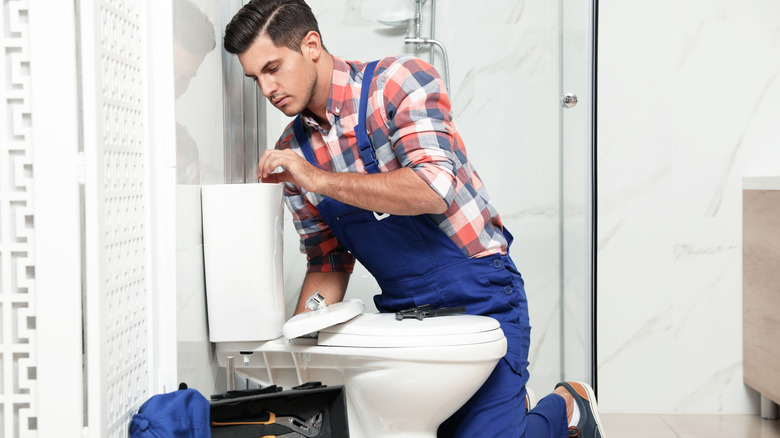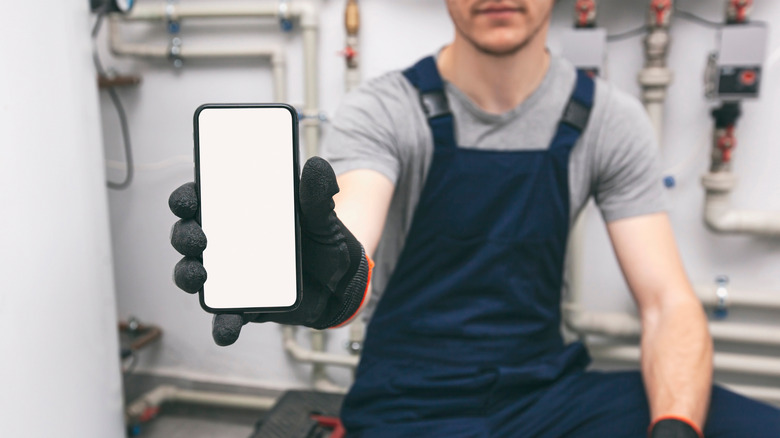The Biggest Scams To Watch For With Plumbers
You're enjoying a peaceful Saturday afternoon when the pipe bursts under your kitchen sink. Water is spraying everywhere and you're in a panic. After you shut off water to the house, you grab your phone and call the first emergency plumber you can find on Google. You don't take the time to read any reviews because you're desperate to get the problem fixed right away, and all plumbers should do the same work, right?
There's no doubt about it: Plumbing is a complex trade that typically requires several years of schooling and countless hours of on-the-job training, as noted by Explore the Trades. Reputable plumbers are in high demand, but unfortunately that also opens the door for scammers. Whether they're licensed plumbers who use shady business practices to get extra money or they never attended a day of plumbing school and are acting the part, there are some major scams to watch for with plumbers. If you've got a burst kitchen pipe, gurgling toilet, or your water heater is kaput, you need to choose a plumber carefully to make sure you don't lose money or end up with shoddy work.
Be wary of plumbers who use cheap materials
Repairing a major plumbing problem can be extremely expensive, so it's understandable that you may be willing to pay extra for the highest-quality materials to ensure the same problem doesn't happen again down the road. A shady plumber might assure you that he's installing the very best, top-of-the-line materials, like PEX piping. You're happy to hear it, and agree to the added cost. Once it comes time to purchase and install the materials, though, he buys a cheap PVC alternate but still charges you the full amount for PEX.
According to Angi, there are a couple of ways to safeguard yourself from this scam. First, don't hesitate to ask the plumber for a list of all the parts he'll be using on your project. Once you have the list, head to a nearby home improvement store and cross-check the pricing of items on the list. It's normal to see a small markup, but if it's exorbitant, ask your plumber for an explanation.
Next, don't be afraid to verify that the parts he's installing match what was on the list in the beginning. If you're paying for a Kohler PEX valve, but the one he's using is a completely different brand, bring it up immediately.
Make sure your plumber isn't hiding their credentials
A licensed, reputable plumber will have nothing to hide if you ask to see his or her credentials. If you're working with a large plumbing contractor, you shouldn't need to ask for licensing information, as all of their employees likely went through a thorough vetting and hiring process. However, if you're using someone who is self-employed, it's a good idea to confirm his or her plumbing license and insurance coverage.
If the plumber balks at providing this information or repeatedly "forgets" to give it to you, that's a major red flag and you should halt any work before it begins. Allowing a plumber without insurance and an expired license (or no license at all) can cause nightmares for you down the road. C and W Plumbing says it's a good idea to go a step further: In addition to confirming that their license is active and valid — this can be done through your state's Contractors State License Board — you also want to read reviews, check for complaints through the Better Business Bureau, and carefully evaluate their website.
If your plumber has lots of helpers, it could be a scam
You're more likely to see this particular scam pop up if you've hired out a lengthy, complicated plumbing job. For quick fix repairs, like a leaky sink or clogged toilet, this scenario probably won't apply. Let's say you're gutting and remodeling a bathroom, and all the plumbing must be redone. You found a plumber you liked and hired him for the job. After a few days, though, more workers are showing up and you have no idea who they are or what they're really doing.
It's not uncommon for a plumber to bring along an apprentice who's learning the ropes and needs some field hours for his or her schooling. This isn't cause for concern as long as the plumber checks any work the apprentice completes to ensure it's done correctly. Home Reference explains that the scam comes into play when the plumber subcontracts additional workers (oftentimes friends or family, though unbeknownst to you). These subcontractors will then bill you separately for the work, and charge a very expensive amount. The scam continues with the plumber claiming he has no control over the subcontractors' pricing, and then they all make a large profit behind your back.
Any time new workers appear for your project, ask for an explanation of who's doing what and why. Confirm with the plumber that any subcontracting fees are already included in the original quote, and that you won't be receiving an additional bill.
Don't hire a plumber who demands cash-only payment
You've found a plumber you like, her quote sounds reasonable, and you're ready for the job to be completed. The plumber then tells you that she only accepts cash for payment, and won't be able to give you a receipt or copy of an invoice. Even if she gives you an excuse, like her printer is broken or her bank charges exorbitant fees for a business account, don't take the bait. By only accepting cash payments, the plumber is likely trying to avoid taxes, but she could be trying to hide the fact that she isn't actually licensed. All of this can spell trouble for you down the road, especially if she does poor work or damages any of your property in the process.
In addition to the cash-only scam, some plumbers may demand 50% of the cost upfront. This is a huge red flag, and there's a good chance they'll take your money and run for the hills. In fact, Home Reference says that many states have laws that cap the upfront cost at 10%.
No written estimate? Don't hire that plumber
Getting an estimate in writing is a critical piece of any plumbing project, and it will protect you down the road if anything goes wrong (especially if you need to take legal action for any reason). Where's the scam in this? Let's say a plumber comes out to give you a quote. As he evaluates everything, he doesn't write anything down but promises to send you a written estimate later. When he leaves, he tells you his estimate and you agree to hire him to do the work.
Weeks go by and he has completed the work. You think nothing of it until you receive the final bill, and it's significantly higher than the verbal estimate he gave you originally. With nothing in writing (that means complete with signatures, too), you're virtually powerless to do anything.
Protect yourself from this scam by insisting on a written quote and signed contract before the work begins, as per Atomic Plumbing & Drain Cleaning. Don't accept excuses! This will eliminate any gray areas or chances for surprise costs down the road.





